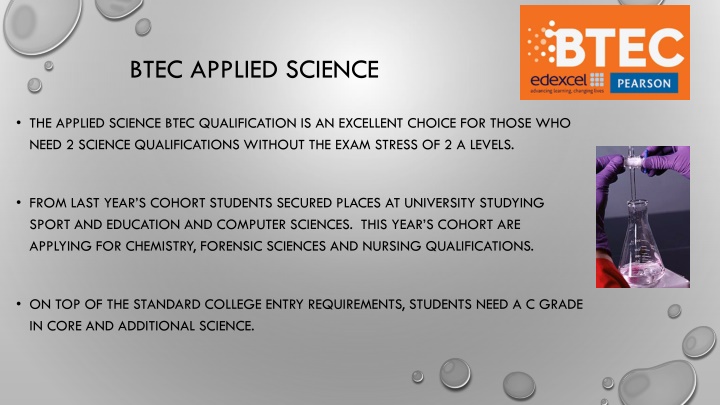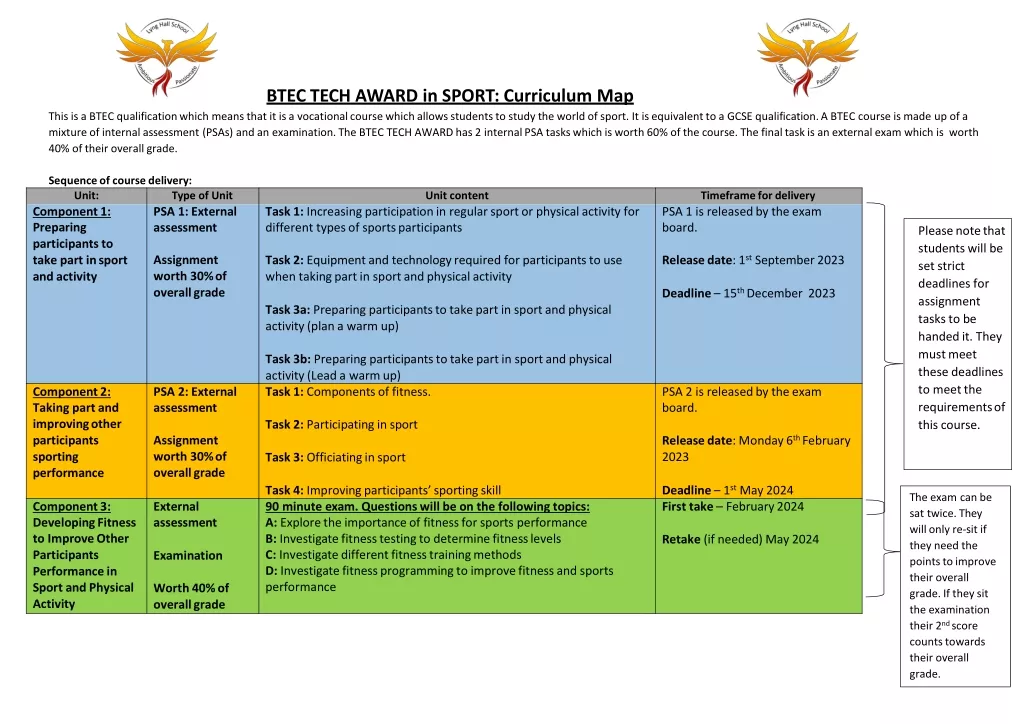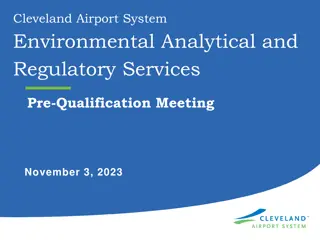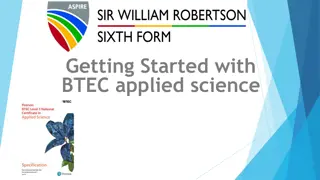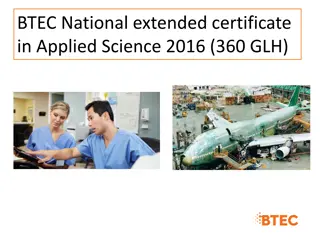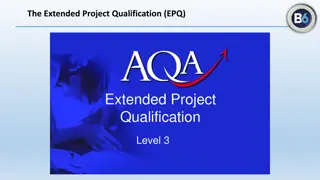BTEC Applied Science Qualification Overview
The BTEC Applied Science qualification offers an alternative route to obtaining two science qualifications without the exam stress of A-levels. Students study a range of topics including principles of science, practical scientific procedures, science investigation skills, laboratory techniques, and more. Assessment methods include exams, practical assessments, projects, and assignments graded as pass, merit, or distinction. The final grade is calculated based on points awarded for each unit, contributing to a final grade ranging from U to D*D*. This qualification is valuable for students pursuing fields such as sport, education, computer sciences, chemistry, forensic sciences, and nursing.
Download Presentation

Please find below an Image/Link to download the presentation.
The content on the website is provided AS IS for your information and personal use only. It may not be sold, licensed, or shared on other websites without obtaining consent from the author.If you encounter any issues during the download, it is possible that the publisher has removed the file from their server.
You are allowed to download the files provided on this website for personal or commercial use, subject to the condition that they are used lawfully. All files are the property of their respective owners.
The content on the website is provided AS IS for your information and personal use only. It may not be sold, licensed, or shared on other websites without obtaining consent from the author.
E N D
Presentation Transcript
BTEC APPLIED SCIENCE THE APPLIED SCIENCE BTEC QUALIFICATION IS AN EXCELLENT CHOICE FOR THOSE WHO NEED 2 SCIENCE QUALIFICATIONS WITHOUT THE EXAM STRESS OF 2 A LEVELS. FROM LAST YEAR S COHORT STUDENTS SECURED PLACES AT UNIVERSITY STUDYING SPORT AND EDUCATION AND COMPUTER SCIENCES. THIS YEAR S COHORT ARE APPLYING FOR CHEMISTRY, FORENSIC SCIENCES AND NURSING QUALIFICATIONS. ON TOP OF THE STANDARD COLLEGE ENTRY REQUIREMENTS, STUDENTS NEED A C GRADE IN CORE AND ADDITIONAL SCIENCE.
BTEC DIPLOMA IN APPLIED SCIENCE IT CONSISTS OF 8 UNITS OF VARYING WEIGHTINGS TOWARD THE FINAL GRADE 2 EXTERNALLY MARKED CLASSIC STYLE EXAMS (UNIT 1 AND 5) 1 EXTERNALLY MARKED PRACTICAL ASSESSMENT (UNIT 3) 1 INTERNALLY MARKED PROJECT (UNIT 6) 2 MANDATORY INTERNALLY MARKED ASSIGNMENTS (UNIT 2 AND 4) 2 INTERNALLY MARKED OPTIONAL MODULES THE ASSIGNMENTS ARE GRADED AS EITHER PASS, MERIT OR DISTINCTION. EACH ASSIGNMENT CONTRIBUTES A POINT SCORE DEPENDING ON THE ACHIEVED GRADE, WHETHER IT IS INTERNALLY OR EXTERNALLY ASSESSED AND THE RECOMMENDED GUIDED LEARNING HOURS.
HOW THE FINAL GRADE IS CALCULATED THE TABLES BELOW SHOW THE DIFFERENT POINTS AWARDED FOR BOTH INTERNAL AND EXTERNALLY MARKED UNITS. EACH ASSIGNMENT SCORE IS ADDED TOGETHER TO GIVE A FINAL GRADE RANGING FROM U TO D*D*. INTERNAL EXTERNAL UCAS POINTS ARE THE SAME AS FOR THE EQUIVALENT GRADES AT A-LEVEL. D*D* = 112 DD = 96 MM = 64
THE UNITS *GLH = Guided learning hours UNIT 1- PRINCIPLES AND APPLICATIONS OF SCIENCE 1 JUNE 2018. CONTENT INCLUDES CHEMICAL PROPERTIES, CELLS AND WAVES UNIT 2 PRACTICAL SCIENTIFIC PROCEDURES AND TECHNIQUES COURSEWORK ASSIGNMENTS. STUDENTS LEARN HOW TO CARRY OUT A RANGE OF SCIENTIFIC TECHNIQUES SUCH AS CALORIMETRY AND TITRATIONS. UNIT 3 SCIENCE INVESTIGATION SKILLS JANUARY 2018. STUDENTS COULD BE TESTED ON ANY EXPERIMENT RELATED TO ELECTRICAL DEVICES, FUELS, ENERGY, DIFFUSION AND SAMPLING TECHNIQUES UNIT 4 LABORATORY TECHNIQUES COURSEWORK ASSIGNMENTS. STUDENTS LEARN ABOUT SAFETY IN A SCIENCE LAB AND HOW CHEMICALS ARE MANUFACTURED. UNIT 5 - PRINCIPLES AND APPLICATIONS OF SCIENCE 2 JANUARY 2019. CONTENT INCLUDES ORGANS AND SYSTEMS, CHEMICAL REACTIONS AND THERMAL PHYSICS UNIT 6 - INVESTIGATIVE PROJECT 90 GLH, INTERNALLY MARKED COURSEWORK ASSIGNMENT. STUDENTS WILL RESEARCH AND CONDUCT AND EXPERIMENT ON A TOPIC OF THEIR CHOOSING. UNIT 11 GENETICS AND GENETIC ENGINEERING 60 GLH, INTERNALLY ASSESSED COURSEWORK STYLE ASSIGNMENTS UNIT 16 ASTRONOMY AND SPACE SCIENCE
